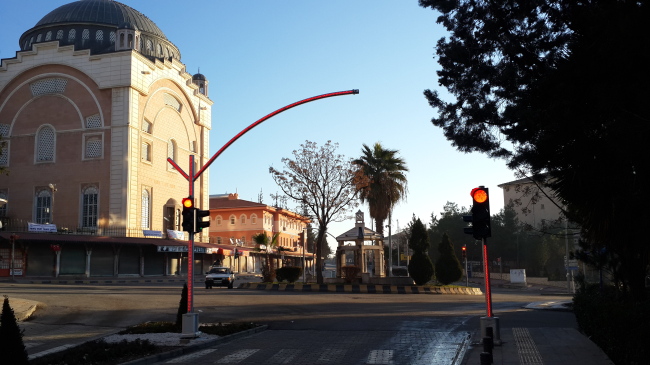A Korean teenager who went missing in Turkey had been driven by a local man to a town near the Syrian border, Seoul officials said Tuesday.
This sparked speculation that he may have entered the conflict-ridden country and joined the Islamic State militant group.
The 18-year-old tourist from Seoul, surnamed Kim, vanished on Jan. 10 after leaving a hotel in the border town of Kilis, according to Korea’s Foreign Ministry and police. He touched down in Istanbul on Jan. 8 and flew to the southern city of Gaziantep before arriving in Kilis by car the next day along with another Korean, who reported his disappearance to the Korean Embassy on Jan. 12.
CCTV footage showed that Kim had ridden in a vehicle with Syrian license plates and used as an unregistered taxi, along with a man who had waved to him at about 8:30 a.m. that day, ministry officials said, citing the police there. But the video failed to help identify the man, who the driver said spoke Arabic and was “ordinary” though he could not specify his nationality.
The driver dropped them off after about 25 minutes near a Syrian refugee camp in Besiriye, some 18 kilometers east of Kilis and 5 kilometers from the frontier. He said that the two men had not conversed during the ride, apparently to avoid revealing their identities.
“The Arab man approached the driver at around 7:30 a.m. that day and asked him to come pick him up one hour later near a mosque across from the hotel where the boy was staying,” a ministry official told reporters on customary condition of anonymity.
 |
A mosque stands across the hotel in the Turkish border city of Kilis, where the missing Korean teenager was found to have met and taken a taxi with a local before vanishing on Jan. 10. (Yonhap) |
The findings are stoking concerns about the teen’s safety and possible ties to the extremist group.
The police here have found images on his computer of IS fighters and flags, as well as evidence that he had been in contact with a purported IS member named Hassan via social networking services such as Twitter and Surespot. In one Twitter post, a user presumed to be Kim said he “wanted to join” the militant group. In another, he wrote he was “ready” to travel to Turkey.
The Seoul Metropolitan Police Agency has concluded that Kim is likely to have attempted to slip into Syria and the purpose of his trip was to join the IS. It plans to unveil the results of its probe on Wednesday, wrapping up a weeklong interview involving his parents and his fellow traveler.
With Turkey and Syria sharing a porous border stretching some 900 kilometers, many foreign terrorist fighters travel from Istanbul to Kilis via Gaziantep to sneak into Syria, experts and activists say.
“The Turkish police said they had not yet passed a border checkpoint but we’ve not been able to figure out their whereabouts since they reached Besiriye despite all our efforts,” the ministry official said.
“We cannot determine anything at this point, nor can we rule out the possibility that he has joined the IS, which would be an extremely worrying situation. We’re working with other related agencies, making his safety and immediate return a top priority.”
The ministry has issued a travel warning for southeastern Turkey, especially within 10 kilometers of the Syrian border. Some Koreans have visited the region for missionary or volunteer work at Syrian refugee camps.
Seoul and Damascus have no official diplomatic relations.
In September, a Saudi Arabian IS member said in an interview that the group consisted of fighters of various nationalities, including Koreans. Seoul officials have dismissed the claim as unreliable.
Adding to the concerns, the armed group issued a video online later in the day purporting to show two Japanese hostages, and demanding $200 million from Tokyo in ransom.
The clip evoked dreary memories for Seoul, which has also been blackmailed by Islamist militants holding Korean nationals hostage in the Middle East.
In 2004, the translator and Christian missionary Kim Sun-il was kidnapped and executed in Iraq by the Jama’at al-Tawhid wal-Jihad group after Korea brushed off demands that it scrap plans to send 3,000 more troops to the country and pull out hundreds of medics and engineers already there.
In 2007, a group of 23 Korean Christians was taken hostage in Afghanistan by the Taliban. Two of them were killed during a standoff, while the rest were eventually freed.
By Shin Hyon-hee (
heeshin@heraldcorp.com)








